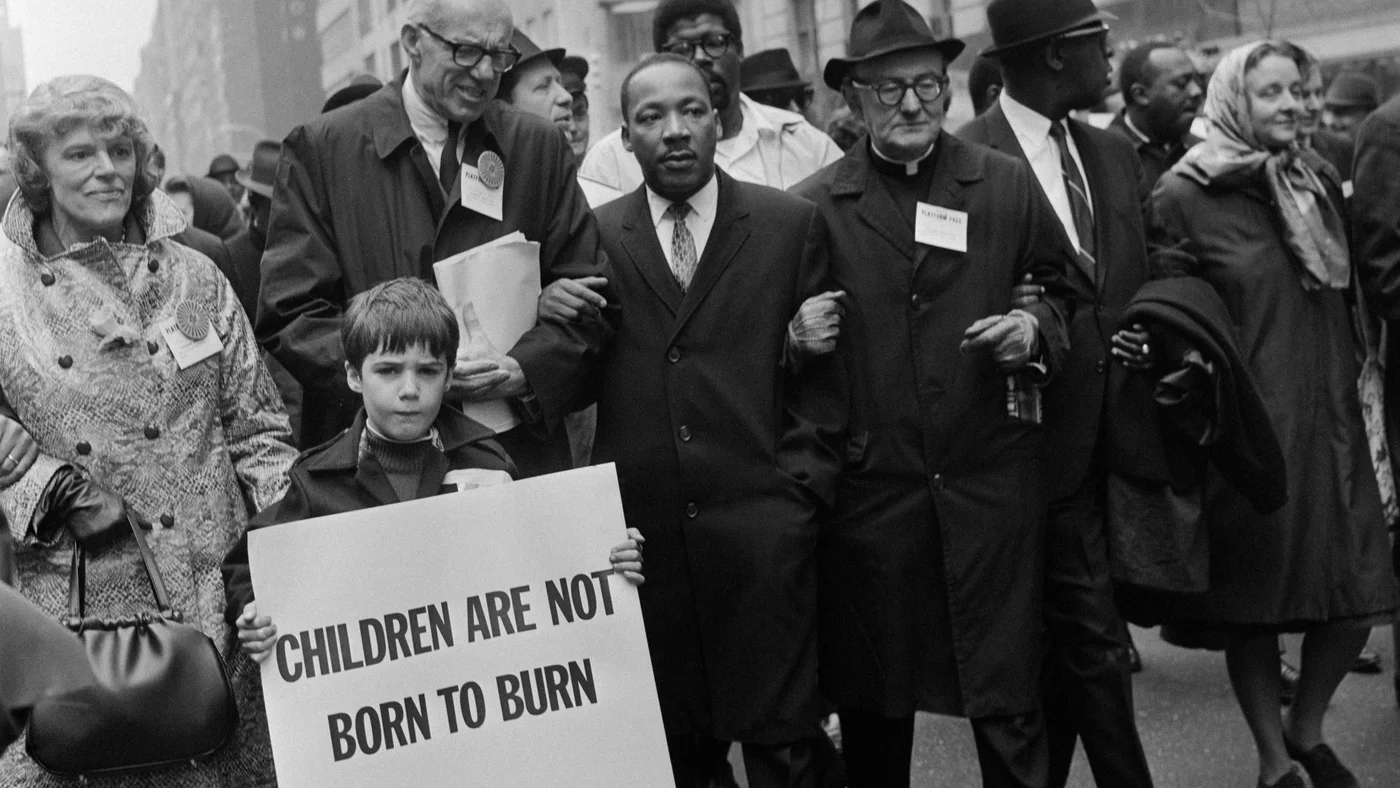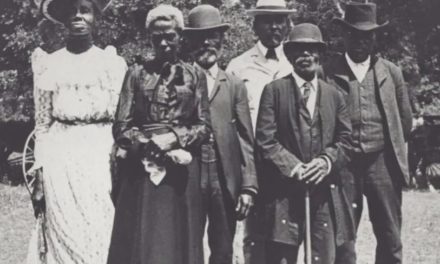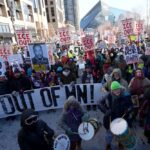Civil rights leader Reverend Martin Luther King Jr, centre, marches against the war on Vietnam during a demonstration in New York, on 16 March 1967 (AFP)
Reverand Martin Luther King Jr was a radical of his time.
In his opposition to the immoral US war on Vietnam, he did not mince his words about what the Americans had done to the Vietnamese people.
He famously said: “We have destroyed their two most cherished institutions: the family and the village. We have destroyed their land and their crops…We have corrupted their women and children and killed their men. Now, there is little left to build on, save bitterness.”
Like Vietnam, MLK’s take on the death and destruction in Gaza would be crystal clear: Israel is, in fact, guilty of genocide, and a fragile ceasefire deal doesn’t change the fact that almost every facet of Palestinian life has been destroyed in part by American weaponry.
Annually, on Martin Luther King Jr Day, a national American holiday to honour the civil rights icon, we witness a disingenuous co-opting of MLK’s life and legacy, one that finds us reading posts from the Federal Bureau of Investigation’s (FBI) official page on X, honouring King’s efforts as a leader of the civil rights movement.
In response to the FBI’s post last year, X’s Community Notes feature – surprisingly – explained that this same FBI “engaged in surveillance of King, attempted to discredit him, and used manipulation tactics to influence him to stop organising. King’s family believed the FBI was responsible for his death”.
Yet US intelligence agencies are not the only co-opters of MLK’s “dream“.
Israeli co-optation
As the genocide of Gaza played out on the screens of horrified human beings all over the world for the last year and a half, Israel’s public relations are in shambles, and its image is forever tarnished.
King’s legacy of ‘peace, tolerance, and equality’ is at complete odds with Israel’s apartheid system, occupation, settlement building on stolen lands, and genocide in Gaza
Its leaders face International Criminal Court arrest warrants, and its historically loyal audience in the West withers away.
To date, more than 46,000 Palestinians have been murdered by indiscriminate Israeli bombardment – nearly 70 percent of those victims are women and children.
Still, Israel’s PR machine is hard at work.
On MLK Day last year, which fell on 15 January, Israel’s official X account posted a quote from the late MLK’s famous sermon titled, “Loving Your Enemies”, delivered at the Dexter Avenue Baptist Church in Montgomery, Alabama, in 1957.
It reads: “Darkness cannot drive out darkness; only light can do that. Hate cannot drive out hate; only love can do that.” It adds that “[we] remember Dr King’s legacy of peace, tolerance and equality”.
The irony speaks for itself.
Less than two weeks after the onslaught on Gaza began in October 2023, Israeli Prime Minister Benjamin Netanyahu said during an address to Israel’s parliament that their war on Gaza was a “struggle between the children of light and the children of darkness, between humanity and the law of the jungle”.
This quote was shared on Netanyahu’s official X account before his office deleted the post the next day, following the bombing of al-Ahli Baptist hospital, with reports of hundreds of casualties.
King’s legacy of “peace, tolerance, and equality” is antithetical, oppugnant to, and at complete odds with Israel’s apartheid system, occupation, settlement building on stolen lands, and current genocide and blockade of Gaza.
‘Simplistic symbols’
Further, to water down King’s legacy to one of a “peace-loving” minister and activist is a mistranslation of his life’s work and eases the co-opting of his name and image for opponents of the same human rights and civil rights he strove to establish.
I alluded to this concept in an article I wrote in 2020 on Malcolm X.
In diluting MLK’s message, we indirectly open the door for Israel’s co-optation.
King is the perfect hero who preached non-violence and love, and Malcolm is the perfect “villain” who served as his violent counterpart, preaching hate and militancy.
The result is not just a dishonest reading of history but a dichotomy allowing King to be curated to make us more comfortable.
Reducing these men to such simplistic symbols allows us to filter political programmes according to how “King-like” they are.
Hence, illegitimate forms of reconciliation are legitimised through King, and legitimate forms of resistance are delegitimised through Malcolm X.
King’s legacy is pro-liberation, and by extension, it is pro-Palestine.
Dr Bernice King, head of the Martin Luther King Jr Center for Nonviolent Social Change and King’s daughter, made it clear early on that had her father witnessed the horror of Gaza, he would have been one of the first vocal supporters of the global ceasefire calls.
“I am certain he would call for Israel’s bombing of Palestinians to cease, for hostages to be released…and for us to work for true peace, which includes justice,” she said.
Those hostages include thousands of Palestinians in Israeli prisons, including an estimated 10,000 Palestinian children over the past 20 years.
In 1967, the Student Nonviolent Coordinating Committee (SNCC), an African-American organisation in which King was heavily involved, published a newsletter that included a section titled, The Palestine Problem.
It listed out arguments against Zionism – referring to it as a settler colonial project. It detailed the mass theft of Palestinian land and addressed the dehumanisation of Arabs. African-American civil rights leaders were globally conscious of the plight of oppressed peoples.
King would travel to Jerusalem via Beirut in 1959.
Throughout his life, King had made plans to visit historic Palestine many other times, but each opportunity would be cancelled beforehand.
Civil rights activist and New York Times columnist Michelle Alexander chronicles a call – recorded by FBI wire-tap – that King had with advisers in 1967, deliberating on whether to accept an invitation from the Israeli government to visit historic Palestine: “I just think that if I go, the Arab world, and of course Africa and Asia for that matter, would interpret this as endorsing everything that Israel has done, and I do have questions of doubt,” he said.
Palestinian liberation
In the late 1960s, Africa and Asia were reeling from decades of European colonisation, and King knew that history well.
That doubt would only increase over time.
King believed that the struggle for justice and freedom was global, and his advocacy for human rights would have naturally extended to the Palestinian cause
Asked in an ABC interview about whether Israel should “give back the land she has taken in conflict without certain guarantees, such as security”, King was clear that the occupation was the central cause of tension.
“I think for the ultimate peace and security of the situation, it will probably be necessary for Israel to give up this conquered territory because to hold on to it will only exacerbate the tensions and deepen the bitterness of the Arabs,” King said.
Israel’s co-opting of MLK is disingenuous and exploitative.
In the context of civil rights revolutionaries of the 20th century, King serves as a scapegoat. His statements on the occupation do not explicitly favour the Palestinian cause, nor do they expressly condemn Israeli human rights abuses.
But other influential figures in the struggle for civil rights, such as James Baldwin, Malcolm X, Muhammad Ali, Angela Davis, and Nelson Mandela, serve as powerful examples of the connection between the fight against racism and colonialism and the support for Palestinian liberation.
King, like many of his peers, believed that the struggle for justice and freedom was global, and his advocacy for equality and human rights would have naturally extended to the Palestinian cause.
The civil rights movement – and all movements designed to free human beings from the shackles of racism, occupation, and apartheid – are natural adversaries to the Zionist project.
MLK’s fight was ultimately focused on nurturing whatever was left of the moral fabric in Jim Crow America.
To argue that King would not just sit silent but actively support the Israeli occupation is an affront to his life’s work. To say that he would also actively support billions of dollars annually in US arms sales to Israel is equally disturbing.
“A nation that continues year after year to spend more money on military defence than on programmes of social uplift is approaching spiritual death,” King said.
Has that spiritual death already occurred?
The views expressed in this article belong to the author and do not necessarily reflect the editorial policy of Middle East Eye.















